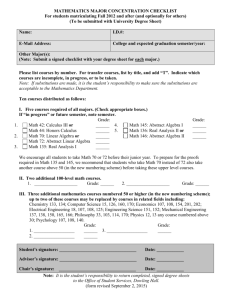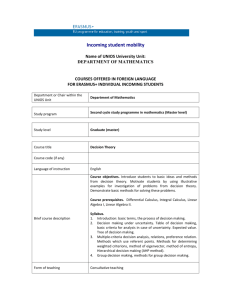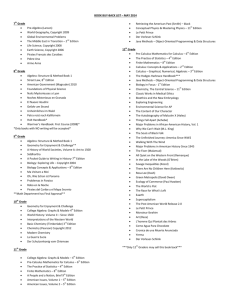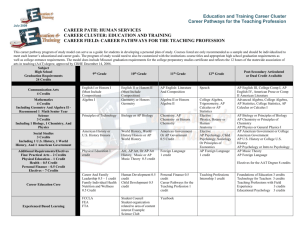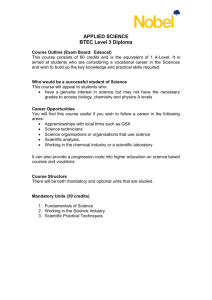Central-Academy-course
advertisement
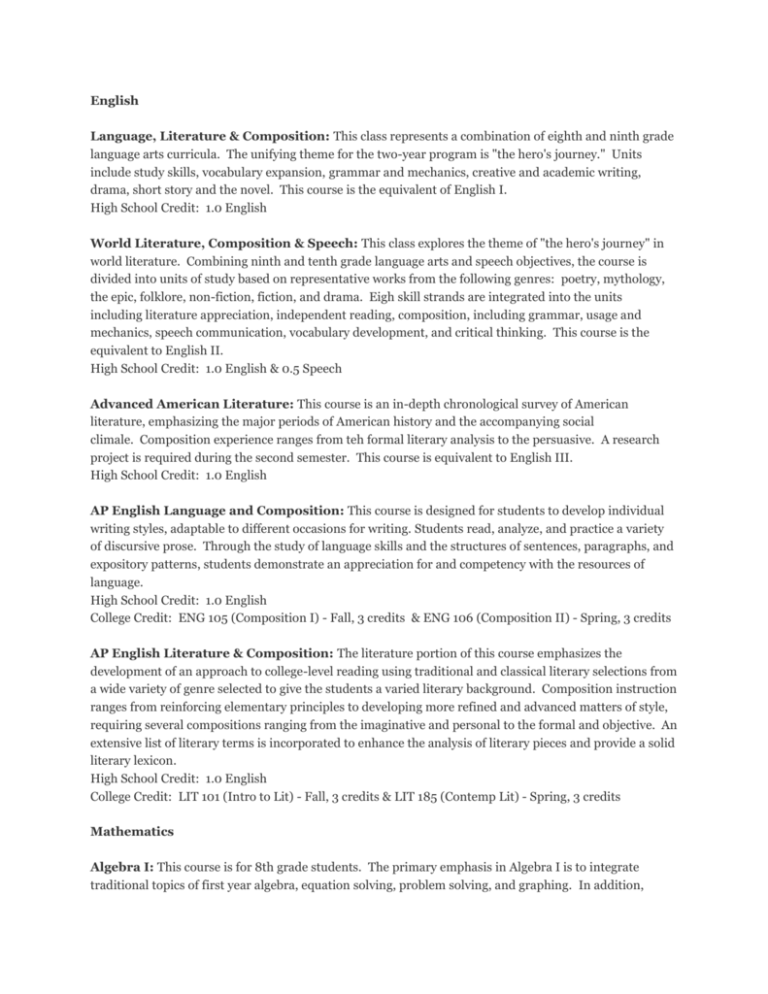
English Language, Literature & Composition: This class represents a combination of eighth and ninth grade language arts curricula. The unifying theme for the two-year program is "the hero's journey." Units include study skills, vocabulary expansion, grammar and mechanics, creative and academic writing, drama, short story and the novel. This course is the equivalent of English I. High School Credit: 1.0 English World Literature, Composition & Speech: This class explores the theme of "the hero's journey" in world literature. Combining ninth and tenth grade language arts and speech objectives, the course is divided into units of study based on representative works from the following genres: poetry, mythology, the epic, folklore, non-fiction, fiction, and drama. Eigh skill strands are integrated into the units including literature appreciation, independent reading, composition, including grammar, usage and mechanics, speech communication, vocabulary development, and critical thinking. This course is the equivalent to English II. High School Credit: 1.0 English & 0.5 Speech Advanced American Literature: This course is an in-depth chronological survey of American literature, emphasizing the major periods of American history and the accompanying social climale. Composition experience ranges from teh formal literary analysis to the persuasive. A research project is required during the second semester. This course is equivalent to English III. High School Credit: 1.0 English AP English Language and Composition: This course is designed for students to develop individual writing styles, adaptable to different occasions for writing. Students read, analyze, and practice a variety of discursive prose. Through the study of language skills and the structures of sentences, paragraphs, and expository patterns, students demonstrate an appreciation for and competency with the resources of language. High School Credit: 1.0 English College Credit: ENG 105 (Composition I) - Fall, 3 credits & ENG 106 (Composition II) - Spring, 3 credits AP English Literature & Composition: The literature portion of this course emphasizes the development of an approach to college-level reading using traditional and classical literary selections from a wide variety of genre selected to give the students a varied literary background. Composition instruction ranges from reinforcing elementary principles to developing more refined and advanced matters of style, requiring several compositions ranging from the imaginative and personal to the formal and objective. An extensive list of literary terms is incorporated to enhance the analysis of literary pieces and provide a solid literary lexicon. High School Credit: 1.0 English College Credit: LIT 101 (Intro to Lit) - Fall, 3 credits & LIT 185 (Contemp Lit) - Spring, 3 credits Mathematics Algebra I: This course is for 8th grade students. The primary emphasis in Algebra I is to integrate traditional topics of first year algebra, equation solving, problem solving, and graphing. In addition, complimentary topics from geometry, discrete math, logical reasoning, probability and statistics, and trigonometry are included. Students successfully completing this course will be on track to take advanced calculus by the time they graduate from high school. High School Credit: 1.0 Math Geometry: The emphasis of Geometry is on the traditional topics of geometry, such as similarity, congruence, and transformations. In addition, appropriate topics from algebra, discrete mathematics, trigonometry, probability and statistics, and logical reasoning are included. High School Credit: 1.0 Math Algebra II: The emphasis of Algebra II is on the traditional topics such as polynomials, exponents, radicals, and logarithms. In addition, appropriate compilmentary topics from geometry, trigonometry, logical reasoning, discrete mathematics, and probability and statistics are included. High School Credit: 1.0 Math Radically Accelerated Geometry I: This radically accelerated math course is the first year in a sequence toward completion of three years of high school mathematics in two calendar years. Students entering this course will be expected to complete the entire Central Academy Geometry course in 27 weeks or less. They will then begin the Central Academy Algebra II course which continues into the following year. These students will be on track to complete two years of college calculus or higher by high school graduation. Enrollment in this course is determined by a placement exam and teacher recommendation. High School Credit: 1.0 Math Honors Radically Accelerated Algebra II/Pre-Calculus: This course represents the second year in a radically accelerated mathematics sequence, designed to teach students three years of matehmatics in two calendar years. Students will complete Algebra II, started in the previous year, and a full year of precalculus. High School Credit: 2.0 Math Advanced Math Problem Solving: The aim of this year-long course is to address topics central to mathematical development that extend beyond the scope of the standard college prepatory curriculum. It is intended for highly motivated, well-prepared, and dedicated mathematics students who are interested in discovering the essence of mathematics. Students will be challenged to learn how to approach, analyze, and solve challenging problems. Students will be stimulated to learn through challenges and through the preparation for competition. With permission of the instructor, students may enroll for a semester at a time or on an independent study basis. High School Credit: 1.0 Math AP Probability & Statistics: This course will introduce students to the major concepts and tools for collecting, analyzing, and drawing conclusions from data. Students will be exposed to four broad, conceptual themes: 1. Exploring data: observing patterns and departures from patterns 2. Planning a study: deciding what and how to measure 3. Anticipating patterns in advance: producing models using probability and simulation 4. Statistical inference: confirming models Students who successfully complete the coure and AP examination may receive college credit and/or advanced standing in college. High School Credit: 1.0 Math College Credit: MAT 157 (Elementary Statistics) - Spring, 4 credits AP Calculus - AB Level: AP Calculus includes the study of elementary functions, limits, continuity, derivatives with applications, and integrals with applications. This course prepares students for the AP exam. Students who successfully complete the course and examination may receive college credit and/or advanced standing in college. High School Credit: 1.0 Math College Credit: MAT 211 (Calculus I) - Spring, 5 credits AP Calculus - BC Level: AP Calculus BC offers a review of first year calculus topics and extends the concept of integration to polar and parametric functions, convergent and divergent series, as well as vectors are developed and analyzed extensively. Successful completion of AP Calculus BC and a passing score on the AP exam is generally accepted as equivalent to the first three semesters of college Calculus, which may lead to college credit and/or advanced standing in college. High School Credit: 1.0 Math College Credit: MAT 217 (Calculus II) - Spring, 5 credits Linear Algebra & Differential Equations: Semester 1: Linear Algebra with Applications: This course involves a study of the use and application of matrices in the solution of systems of linear equations, determinants, vector spaces, linear transformations, eigenvalues, eigenvectors, bases and projections. Linear algebra is a core course in many engineering, physics, mathematics, and computer science programs. This course makes heavy use of computing techology, and graphing calculators are required. High School Credit: 0.5 Math College Credit: MAT 148 (Linear Algebra) - Fall, 4 credits Semester 2: Differential Equations with Laplace: This course involves the study of ordinary differential equations, systems of ordinary differential equations, Laplace transforms, numerical methods and applications. MAT 217 (AP Calculus BC) or equivalent must be taken concurrently or prior to this course. High School Credit: 0.5 Math College Credit: MAT 227 (Differential Equations) - Spring, 4 credits Science Biology & Pre Chemistry/Physics: This course, for 8th grade students, studies concepts and developments in the fields of biology, chemistry, and physics. The entire high school Biology curriculum is taught in one semester, and during the opposite semester topics in physics and chemistry are addressed to provide a foundation for further study in those areas. Laboratory activities use inquiry processes and reinforce concepts studied in class. This class provides a foundation for future science classes at Central Academy. High School Credit: 1.5 Science (1.0 Biology & 0.5 science elective) Accelerated Chemistry & Accelerated Physics: This course is one full year of chemistry and one full year of physics condensed into one calendar year of study. The topics studied in this course are aligned with future AP science courses. Topics for chemistry include matter and its composition, chemical reactions, atomic structure, energy changes, acid-base chemistry, and organic chemistry. Lab activities will reinforce the course concepts. Topics for physics include kinematics, forces, energy, sound and light waves and properties, electromagnetic spectrum, and electricity magnetism. Lab activities reinforce course concepts. High School Credit: 2.0 Science (1.0 Chemistry & 1.0 Physics) AP Biology: This course is the equivalent of a college-level introductory biology course. It is an intensive study of life, emphasizing the molecular biology of the cell, genetics, evolution, organisms, and populations. Laboratory activities challenge the students' abilities to understand problems, develop and implement experiemental designs, manipulate data, and think analytically. Required labs are arranged outside of regular school hours. High School Credit: 1.0 Science (Biology) AP Chemistry: This course is an intensive study of matter at the atomic and molecular levels, emphasizing inorganic chemistry. There is a concentration on the mathematical treatment of the princples of college chemistry. The course covers formula writings, types of chemical reactions, stoichiometry, atomic and molecular structure, gases, kinetics, equilibrium, acid-base chemistry, and thermodynamics. Laboratory work is equivalent to freshman college-level with formal reports. Required labs are arranged outside of regular school hours. High School Credit: 1.0 Science (Chemistry) College Credit: CHM 165 (Gen/Inorganic Chemistry) - Fall, 4 credits & CHM 175 (Gen/Inorganic Chemistry) - Spring, 4 credits AP Physics: This freshman college-level course includes both classical and modern physics, emphasizing the mathematical treatment of physical events. The course covers topics such as kinematics, thermodynamics, wave motion, magnetism, electricity, optics and modern physics. Required labs are arranged outside of regular school hours. High School Credit: 1.0 Science (Physics) AP Environmental Science: This course is equivalent to an introductory college course stressing scientific principles and analysis. The goal of the course is to provide students with scientific principles, concepts and methodologies to understand the interrelationship of the natural world; to identifiy and anlyze natural and man-made environmental problems; to evaluate the relative risk associated with these problems; and to examine alternative solutions for resolving and preventing them. There are strong lab and field investigations, allowing students to learn about the environment through firsthand observation. Some field experiences are arranged outside of school hours. High School Credit: 1.0 Science College Credit: ENV 115 (Environmental Science) - Fall, 3 credits Social Studies American Government & Current Issues: Using the DMPS 12th grade curriculum and materials, Central Academy eighth grade students study the United States goverment. Content includes the philosophy and history of American government, as well as the structures and operations of its major divisions. Writing and critical thinking skills are stressed. Students completing this course may elect to receive high school credit, fulfilling the graduation requirement for US Goverment. Many students in this class will go on to take AP US Government as seniors. High School Credit: 0.5 Goverment & 0.5 Social Studies elective AP Human Geography/World Civilizations: This course introduces students to the systematic study of patterns and processes that have shaped human understanding, use, and alteration of Earth's surface. Students employ spatial concepts and landscape analysis to examine human social organization and its environmental consequences. Students will learn about the methods and tools geographers use in their science and practice. Through the AP curriculum, students will also be introduced to the stages of social, economic, and cultural development of the human race. High School Credit: 1.0 World History AP United States History: The scope and sequence of this course mirrors the college-level US History course. AP students are required to study college-level primary and secondary sources and develop skills to write succinct, yet carefully documented essays. This course satisfies the DMPS and state of Iowa graduation requirement for US History. High School Credit: 1.0 US History College Credit: HIS 150 (Amer History 1492 - 1877) - Fall, 4 credits & HIS 153 (Amer History 1877 present) - Spring, 4 credits AP European History: This course surveys European history from 1450 AD to the present. Organized along a chronological formal, major themes are investigated which include the evolution of democratic and capitalistic systems, social history, women's studies, conflice resolution, philosophy and fine arts, and the roles of religion, science, and technology in European society. Important skills are stressed, including formal essay writing, critical thinking, working with primary and secondary sources, and reading collegelevel materials for comprehension and analysis. High School Credit: 1.0 World History College Credit: HIS 113 (Western Civ: Early Modern to Present) - Spring, 4 credits AP World History: This is a study equivalent to an introductory college course in world history. It develops greater understanding of the evolution of global processes, contacts, and interaction with different types of human societies from 1000 AD to the present. The course highlights the nature of changes in international frameworks and their causes and consequences, as well as comparisons among major societies, developments that illustrate major themes, and relationships between major civilizations in Asia, Africa, Europe, and the Americas. Themes include: the impact of interactions among societies through trade, war and diplomacy; the impact of technology and demography on people and the environment; systems of social structure and gender changes in function and structure of states, and in attitudes toward state and political identities. High School Credit: 1.0 World History College Credit: HIS 112 (West Civ: Ancient to Early Modern) - Fall, 4 credits & HIS 113 (West Civ: Early Modern to Present) - Spring, 4 credits AP Macroeconomics: This one-semester course is designed to give students a thorough understanding of the principles of economics. It places particular emphasis on the study of national income, price determination, economic performance measures, economic growth, unemployment, inflation, fiscal policy, monetary policy, and international economics. High School Credit: 0.5 Economics AP Comparative Government & Politics: This one-semester course introduces students to the fundamental concepts used by political scientists to study the processes and outcomes of politics in a variety of country settings. This course aims to ilustrate the rich diversity of political life, to shwo available institutional alternatives, to explain differences in processes and policy outcomes, and to communicate the importance of global political and economic changes. Students study the following six countries and their goverments: Britain, Russia, China, Mexico, Nigeria, and Iran. The major themes and concepts include sovereignty, authority, and power; political institutions; citizens, society, and the state; political and economic change; and public policy. High School Credit: 0.5 Social Studies elective College Credit: POL 125 (Comparative Government & Politics) - Spring, 3 credits AP US Government & Politics: This one-semester course gives students an analytical perspective on goverment and policies in the United States. This course includes both the study of general concepts used to interpret US policies and the analysis of specific examples. It also requires familiarity with various institutions, groups, beliefs, and ideas that affect US politics. Topics include the Constitutional underpinnings of the US government, political behaviors and beliefs, political parties, interest groups, the mass media, the institutions of the national government, public policy, and civil rights/civil liberties. This course satisfies the DMPS and state of Iowa graduation requirement for US government. High School Credit: 0.5 US Government College Credit: POL 111 (American National Government) - Fall, 3 credits Fine Arts Beginning Throwing: This course specializes in wheel-thrown pottery. Student potters will learn the fundamentals of throwing on the pottery wheel and explore surface treatments while pushing the boundaries of the materials and themselves. Students, with dedication to learning these skills, will create vases, cups, bowls, and more after their first year. High School Credit: 0.5 Fine Arts/semester Intermediate & Advanced Throwing: Intermediate and Advanced Pottery focuses on refining throwing skills while experimenting with a variety of clay bodies and learning advanced throwing techniques, along with hands-on kiln/firing experience. High School Credit: 0.5 Fine Arts/semester

